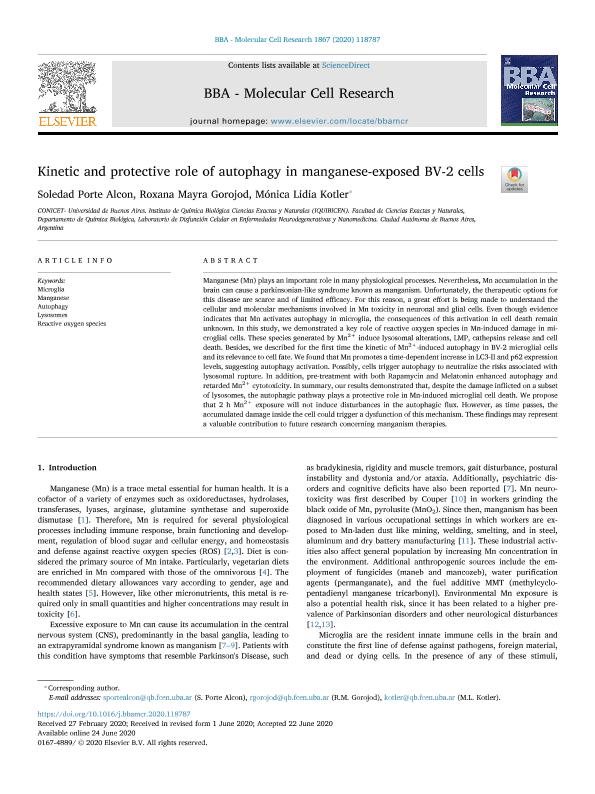Artículo
Kinetic and protective role of autophagy in manganese-exposed BV-2 cells
Fecha de publicación:
10/2020
Editorial:
Elsevier Science
Revista:
Biochimica et Biophysica Acta-Molecular Cell Research
ISSN:
0167-4889
e-ISSN:
1879-2596
Idioma:
Inglés
Tipo de recurso:
Artículo publicado
Clasificación temática:
Resumen
Manganese (Mn) plays an important role in many physiological processes. Nevertheless, Mn accumulation in the brain can cause a parkinsonian-like syndrome known as manganism. Unfortunately, the therapeutic options for this disease are scarce and of limited efficacy. For this reason, a great effort is being made to understand the cellular and molecular mechanisms involved in Mn toxicity in neuronal and glial cells. Even though evidence indicates that Mn activates autophagy in microglia, the consequences of this activation in cell death remain unknown. In this study, we demonstrated a key role of reactive oxygen species in Mn-induced damage in microglial cells. These species generated by Mn2+ induce lysosomal alterations, LMP, cathepsins release and cell death. Besides, we described for the first time the kinetic of Mn2+-induced autophagy in BV-2 microglial cells and its relevance to cell fate. We found that Mn promotes a time-dependent increase in LC3-II and p62 expression levels, suggesting autophagy activation. Possibly, cells trigger autophagy to neutralize the risks associated with lysosomal rupture. In addition, pre-treatment with both Rapamycin and Melatonin enhanced autophagy and retarded Mn2+ cytotoxicity. In summary, our results demonstrated that, despite the damage inflicted on a subset of lysosomes, the autophagic pathway plays a protective role in Mn-induced microglial cell death. We propose that 2 h Mn2+ exposure will not induce disturbances in the autophagic flux. However, as time passes, the accumulated damage inside the cell could trigger a dysfunction of this mechanism. These findings may represent a valuable contribution to future research concerning manganism therapies.
Palabras clave:
AUTOPHAGY
,
LYSOSOMES
,
MANGANESE
,
MICROGLIA
,
REACTIVE OXYGEN SPECIES
Archivos asociados
Licencia
Identificadores
Colecciones
Articulos(IQUIBICEN)
Articulos de INSTITUTO DE QUIMICA BIOLOGICA DE LA FACULTAD DE CS. EXACTAS Y NATURALES
Articulos de INSTITUTO DE QUIMICA BIOLOGICA DE LA FACULTAD DE CS. EXACTAS Y NATURALES
Citación
Porte Alcon, Soledad; Gorojod, Roxana Mayra; Kotler, Monica Lidia; Kinetic and protective role of autophagy in manganese-exposed BV-2 cells; Elsevier Science; Biochimica et Biophysica Acta-Molecular Cell Research; 1867; 10; 10-2020; 1-15
Compartir
Altmétricas




